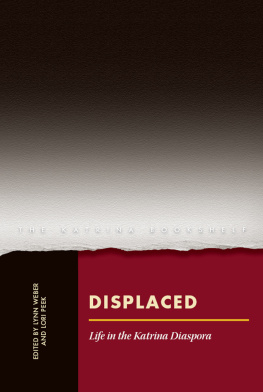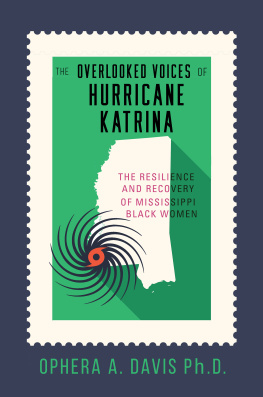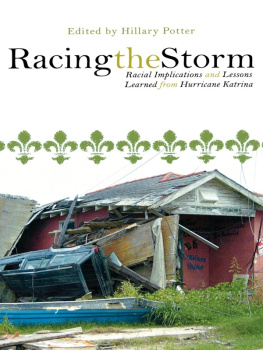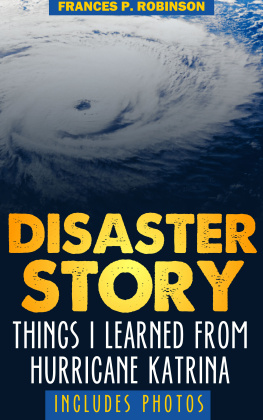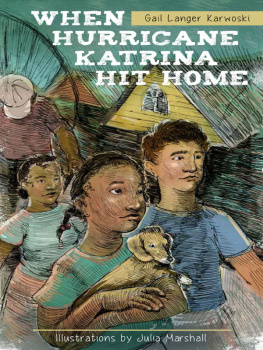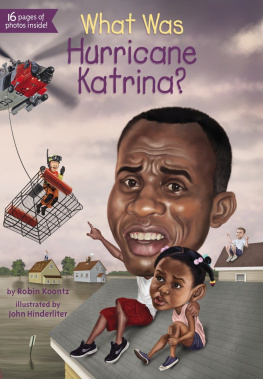Lynn Weber - Displaced: Life in the Katrina Diaspora
Here you can read online Lynn Weber - Displaced: Life in the Katrina Diaspora full text of the book (entire story) in english for free. Download pdf and epub, get meaning, cover and reviews about this ebook. year: 2012, publisher: University of Texas Press, genre: Politics. Description of the work, (preface) as well as reviews are available. Best literature library LitArk.com created for fans of good reading and offers a wide selection of genres:
Romance novel
Science fiction
Adventure
Detective
Science
History
Home and family
Prose
Art
Politics
Computer
Non-fiction
Religion
Business
Children
Humor
Choose a favorite category and find really read worthwhile books. Enjoy immersion in the world of imagination, feel the emotions of the characters or learn something new for yourself, make an fascinating discovery.
- Book:Displaced: Life in the Katrina Diaspora
- Author:
- Publisher:University of Texas Press
- Genre:
- Year:2012
- Rating:4 / 5
- Favourites:Add to favourites
- Your mark:
- 80
- 1
- 2
- 3
- 4
- 5
Displaced: Life in the Katrina Diaspora: summary, description and annotation
We offer to read an annotation, description, summary or preface (depends on what the author of the book "Displaced: Life in the Katrina Diaspora" wrote himself). If you haven't found the necessary information about the book — write in the comments, we will try to find it.
This moving ethnographic account of Hurricane Katrina survivors rebuilding their lives away from the Gulf Coast inaugurates The Katrina Bookshelf, a new series of books that will probe the long-term consequences of Americas worst natural disaster.
Displaced: Life in the Katrina Diaspora — read online for free the complete book (whole text) full work
Below is the text of the book, divided by pages. System saving the place of the last page read, allows you to conveniently read the book "Displaced: Life in the Katrina Diaspora" online for free, without having to search again every time where you left off. Put a bookmark, and you can go to the page where you finished reading at any time.
Font size:
Interval:
Bookmark:
DISPLACED
T HE KATRINA BOOKSHELF
Kai Erikson, Series Editor
DISPLACED
LIFE IN THE KATRINA DIASPORA
EDITED BY LYNN WEBER AND LORI PEEK
with
SOCIAL SCIENCE RESEARCH COUNCIL RESEARCH NETWORK ON PERSONS DISPLACED BY HURRICANE KATRINA

University of Texas Press
AUSTIN
Copyright 2012 by the University of Texas Press
All rights reserved
Printed in the United States of America
First edition, 2012
Requests for permission to reproduce material from this work should be sent to:
Permissions
University of Texas Press
P.O. Box 7819
Austin, TX 787137819
www.utexas.edu/utpress/about/bpermission.html
LIBRARY OF CONGRESS CATALOGING-IN-PUBLICATION DATA
Displaced : life in the Katrina diaspora / edited by Lynn Weber and Lori Peek ; with Social Science Research Council Research Network on Persons Displaced by Hurricane Katrina. 1st ed.
p. cm. (The Katrina Bookshelf)
Includes index.
ISBN 978-0-292-73577-4 (cloth : alk. paper) ISBN 978-0-292-73764-8 (pbk. : alk. paper) ISBN 978-0-292-73578-1 (e-book) ISBN 978-0-292-74745-6 (individual e-book)
1. Hurricane Katrina, 2005Social aspects. 2. RefugeesLouisianaNew OrleansSocial conditions. 3. Internally displaced personsUnited StatesSocial conditions. 4. Disaster victimsUnited StatesSocial conditions. 5. Disaster reliefSocial aspectsUnited States. I. Weber, Lynn. II. Peek, Lori A. III. Social Science Research Council (U.S.).
Research Network on Persons Displaced by Hurricane Katrina.
HV636 2005. N4 D57 2012
305.9069140973dc23 2011048526
For the survivors of Katrina
CONTENTS
Bonnie Thornton Dill
Lynn Weber and Lori Peek
Lynn Weber
Introduction by Lee M. Miller
Lori Peek
Laura Lein, Ronald Angel, Julie Beausoleil, and Holly Bell
Jessica W. Pardee
Lynn Weber
Lee M. Miller
Alice Fothergill and Lori Peek
Introduction by Jacquelyn Litt
Elizabeth Fussell
Jacquelyn Litt
Beverly J. Mason
Cynthia M. Garza
Pamela Jenkins
Introduction by Lynn Weber
Rachel E. Luft
FOREWORD
In October 2006, I joined members of the Social Science Research Council Research Network on Persons Displaced by Hurricane Katrina on a site visit to New Orleans and the Gulf Coast to view the impact of the storm and floods. As someone who had first become acquainted with the project through an initial meeting convened by Jacquelyn Litt and Kai Erikson in August 2006, I was eager to do whatever I could to encourage and support systematic and principled explorations into the lives and experiences of people who had been directly affected by this disaster, as well as to learn as much as I could about what was being and had been done up to that point.
That trip was a deeply moving one for all of us. For those who had begun to work with displaced families now living in new and unfamiliar communities, it provided context and a better understanding both of what people had lost and what remained. One year later the extent of the devastation was still vast, and the desolation in many areas was eerie. Among the many memorable experiences was a visit to a Federal Emergency Management Agency (FEMA) trailer camp in which one member of the group, Rachel E. Luft, a faculty member at the University of New Orleans, was living. As Rachel showed us the small and cramped living quarters, she asked us to notice the smell. She told us that all of the trailers reeked of formaldehyde and that she kept her windows open so that she was always getting fresh aireven in the heat. She made a wry remark about how it felt like a double assault; first they were displaced, then they returned only to be buried alive in toxic FEMA trailers. About six months later, the issue of formaldehyde in FEMA trailers made national news and created quite a controversy. But Rachel, like so many others who were living the experience of the hurricane, flood, displacement, and relocation, knew the truths of this story long before state and federal officials acknowledged it. This book is about those kinds of truths: truths that arise as people recount and share their lived experiences of having their home and family moorings blown away, flooded out, and scattered across the country; truths that are revealed as people are trying to resettle in new communities or return to the old ones.
The organization of this edited collection reflects the assertion made in Lynn Weber and Lori Peeks introduction: Most of the contributors, when asked how they came to do this work, said, It came to me. The chapters in the first section grew out of the researchers engagement with Katrina survivors who relocated to new communities. This set of essays examines the community context and the interactions and encounters of displaced Gulf Coast residents in Colorado, Louisiana, Missouri, South Carolina, and Texas, where a number of the authors lived and worked. Their analyses show the difference that location makes in a communitys ability to welcome, accommodate, and provide resources that facilitate the adjustment of newcomers, many of whom become long-term residents.
The chapters in the second section of the book reflect the authors engagement in and observation of relationships and interactions among Katrina survivors. It focuses on the ways in which social networks, both within and far from hometowns, simultaneously served as a lifeline for survival and recovery, yet also fractured under the stress and duration of these events. Through their explorations of personal networks, community organizations, and religious institutions, the authors illustrate how race, class, gender, and citizenship intersected to create differing sets of constraints and opportunities regardless of whether people ended up near or far from their former homes. The book ends with a brief final section, Charting a Path Forward. It describes one post-Katrina social movements effort to organize displaced New Orleanians, and identifies the possibilities and challenges of movement building in the context of disaster.
This book makes contributions to the scholarship on Katrina that are important and unique for a number of reasons. First, it not only documents the existence of a Katrina diaspora resulting from the dispersion of tens of thousands of people across the United States, but also provides thick description and astute analyses of the experience. It tells the insiders stories. Second, the book is a collaborative product, the result of a series of meetings, conversations, site visits, and shared manuscripts among the authors. Extended intellectual dialogue and collaborative feedback among so many authors, themselves spread across the country, are unusual, yet they are apparent in the intellectual cohesiveness of the collection. Third, an intersectional analytical framework informs all of these essays and reflects the authors efforts to grapple together with how to best understand and explain what they learned.
Finally, this book is unique in the Katrina scholarship because it is written by and focuses primarily on women. All of the authors, with the exception of one coauthor, are women, and many are noted Womens Studies scholars. Like Weber, they are people who have written extensively on the concept of intersectionality, illustrating how different dimensions of difference and inequality shape and inform each other: Litt a scholar of gender, family, and carework, and Lein, who has published noted books and articles on women, families, and poverty, among others. Far too little of the writing on Katrina has paid serious attention to gender and especially to the intersections of gender with race and class. This book, then, fills a space that has been almost empty for too long.
Next pageFont size:
Interval:
Bookmark:
Similar books «Displaced: Life in the Katrina Diaspora»
Look at similar books to Displaced: Life in the Katrina Diaspora. We have selected literature similar in name and meaning in the hope of providing readers with more options to find new, interesting, not yet read works.
Discussion, reviews of the book Displaced: Life in the Katrina Diaspora and just readers' own opinions. Leave your comments, write what you think about the work, its meaning or the main characters. Specify what exactly you liked and what you didn't like, and why you think so.

